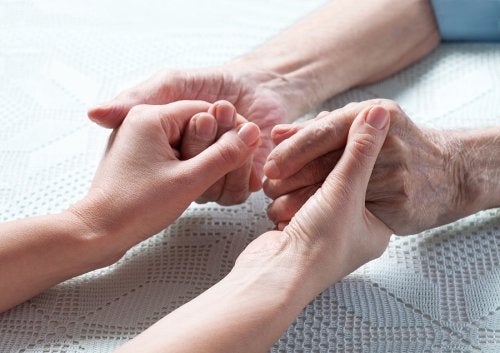-
Comfort for Caregivers During the Final Stages of Life
When a loved one is receiving hospice care in Memphis , it can be extremely difficult for family and friends to come to terms what is happening. It’s important to remember that end-of-life care is focused on your loved one’s comfort, so you can feel confident that he or she is not suffering. Part of hospice care is also caring for the family and friends of the person who is nearing the end of his or her life, so rely on the help that is available.
Remember to make time for yourself each day to focus on something that brings you pleasure, whether it is a coffee with a friend or simply watching television. Let the hospice provider meet the care needs of your loved one so you can focus exclusively on the time you have together. Don’t fall victim to isolation. Talk about your feelings to family and friends, and ask for help from the hospice caregiver when you need it. He or she can be a tremendous source of comfort, information, and support during this time.

-
A Step-by-Step Guide to Dementia Care
When a loved one is diagnosed with dementia, making a care plan is one of the most important first steps to take. Ultimately, depending on the type of dementia, your loved one may need occasional assisted living services, in-home care, and ultimately hospice in Memphis for his or her comfort and safety. Whether your loved one has Alzheimer’s disease or another form of dementia, here is a closer look at the steps involved in providing care.

In the early stages of dementia, your loved one may only need occasional help with things like cooking and cleaning that can become dangerous for someone with dementia. People with dementia that can benefit from assisted living services are usually have mild symptoms and are still able to provide most of their own care. Assisted living support from a home care aide can supplement the care provided by your family as much or as little as you prefer, in accordance with your schedule and your loved one’s needs.
Around-the-clock in-home care is the next step in most dementia care plans. This level of care becomes necessary when it is no longer safe for your loved one to be home alone. An in-home care aide can assist with meal preparation, cleaning, errands, medication reminders, and companionship. He or she can keep your loved one feeling safe and secure. Again, full-time in-home care schedules can be tailored to meet the specific needs of your family.
When your loved one is in need of end-of-life care, trained hospice care providers can support your entire family while ensuring your loved one is comfortable. Many people who get hospice care for a loved one are grateful for the support they received and the ability to be able to focus on spending time with their loved one at the end of his or her life. Hospice care providers can work with your loved one’s medical team to ensure that he or she has everything they need to be peaceful and comfortable.
-
What Seniors Need to Know About Heart Disease
Many seniors are living with heart disease, and it’s so important for them and those in charge of elder care in Memphis to be aware of the signs of complications, such as heart attacks. A few minutes can mean the difference between life and death when it comes to heart disease, so what this video to learn the signs you need to know.
Whether you’re a senior or a caregiver, know that most heart attacks don’t involve sudden, severe pain like they do on television. Instead, they start slowly, with chest pain that comes and goes, shortness of breath, and pain elsewhere in the upper body. If you provide elder care for someone with heart disease, these symptoms should be considered red flags that the person in your care needs emergency treatment. In-home care aides can save lives by being present and acting quickly when the person they are caring for has heart attack symptoms.
-
Planning for Recovery from Back Surgery
Back surgery is a serious procedure that typically involves a lengthy recovery. You or your loved one may spend a period of time in an in-patient treatment facility before transitioning to care at home. Having a plan for recovery that includes a plan for an in-home caregiver in Memphis and the appropriate assisted living services before the surgery is essential, so you can avoid being forced into making rushed decisions at a stressful time. If back surgery is on your schedule, here are some ways to plan for your recovery.

Get Recovery Supplies
After back surgery, it may be necessary to rely on medical devices, such as a walker, cane, toilet chair, and shower bars. Get these items before the procedure so they are set-up and ready to be used. The back surgeon will also provide prescriptions for pain medications and in some cases, antibiotics that can be filled before surgery. It is very important to stay on top of pain medication doses and refills, so that there is no risk of running out of the medications.
Make a Plan for Caregiving
Whether you or your loved one go straight home after surgery or spend time in a in-patient facility, it will be necessary to have in-home caregiving for an extended period of time. Decide how much care can be provided by family members, if any, and when you will need a home care aide to give assistance. Set up a schedule that includes the right mix of assisted living care provided by an in-home caregiver and care provided by loved ones.
Focus on Transition Care
The time in which patients leave the hospital and return home can be especially dangerous and demanding after back surgery. The risk of falling is high, and patients need assistance with everything from personal hygiene to transportation. Hiring a home care aide for transition care helps families feel confident that their loved ones always have the assistance they need during this crucial part of recovery.
